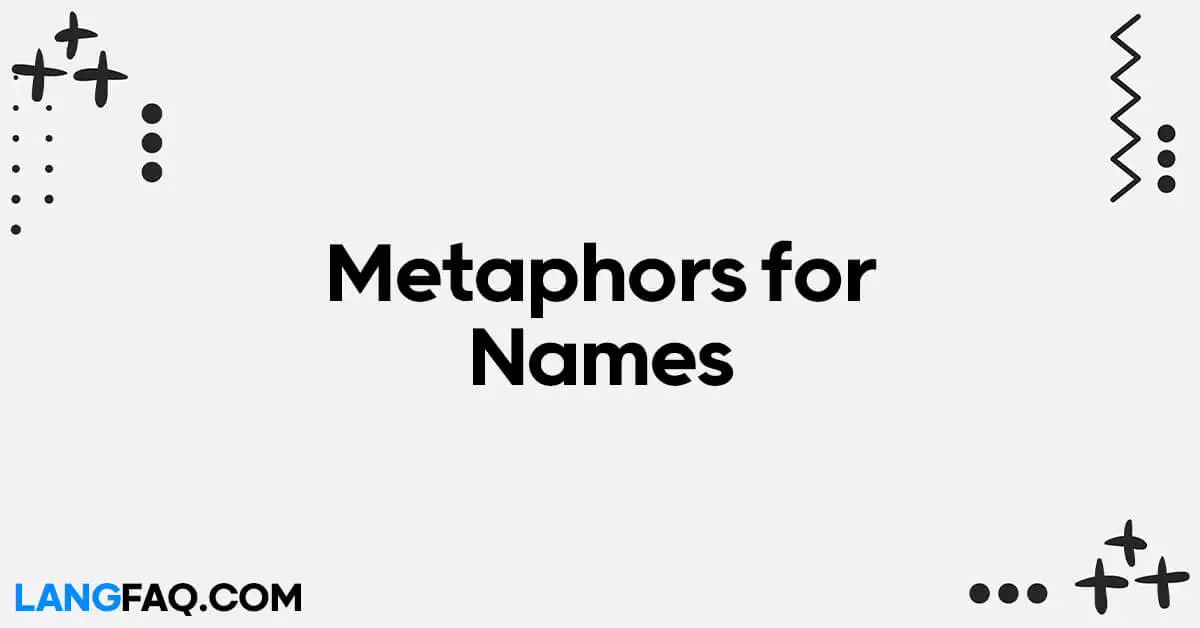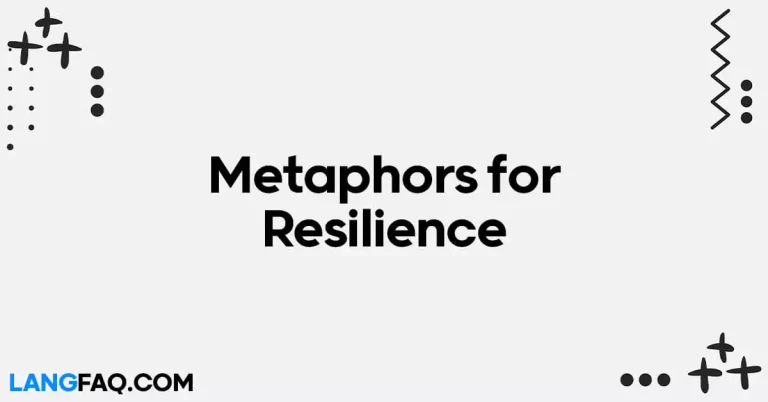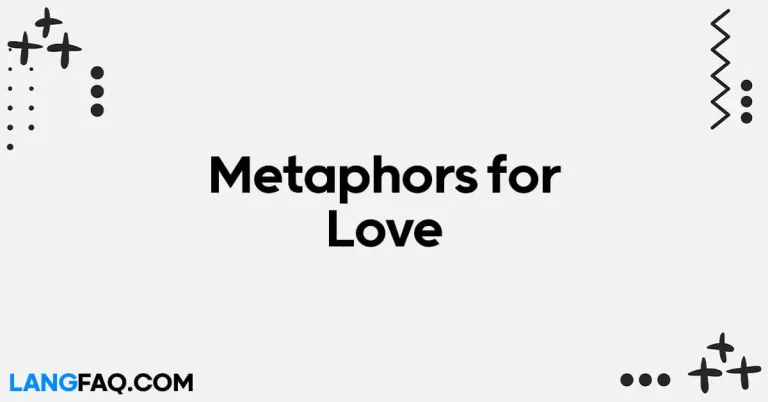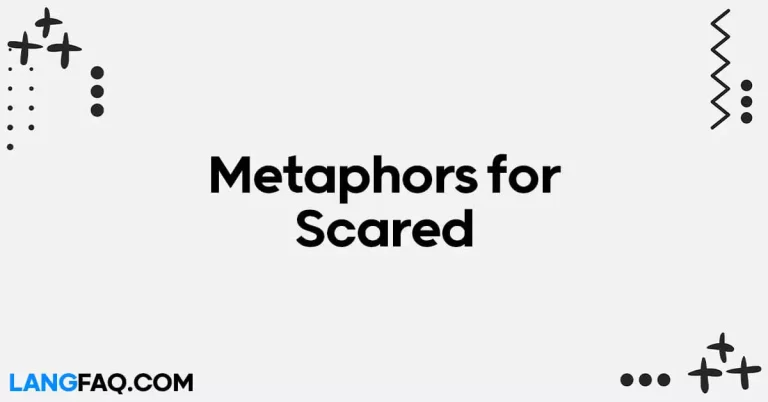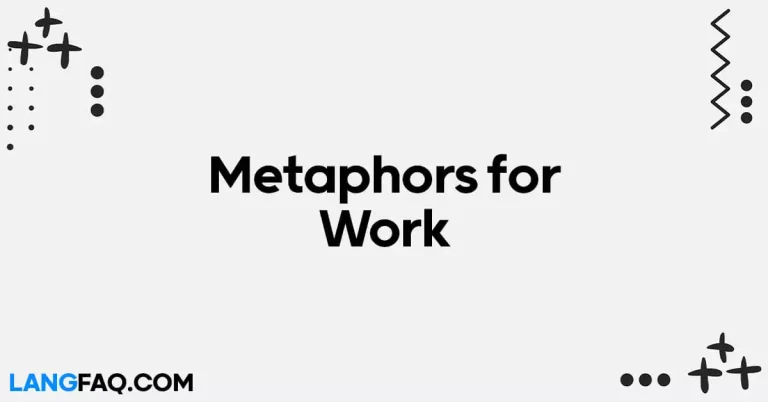In the vast tapestry of language, names serve as intricate threads weaving through our lives. Uncover the richness of expression with our exploration of “26 Metaphors for Names,” delving into the nuanced and symbolic aspects that names encapsulate.
26 Metaphors for Names
- The Symphony of Identity: Names orchestrate the unique melody that defines an individual, harmonizing various aspects of cultural, familial, and personal identity.
- A Tapestry of Heritage: Names are like a finely woven tapestry, intertwining threads of familial stories, traditions, and values.
- The Architectural Blueprint: Names shape the framework of an individual’s character, much like the detailed blueprint of a structure.
- The Botanical Allegory: Similar to blooming flowers, names represent growth, potential, and the unfolding beauty of an individual’s identity.
- Celestial Monikers: Names are celestial bodies, illuminating the darkness with their unique brilliance and guiding individuals through life.
- The Culinary Composition: Names are a flavorful blend, each ingredient contributing to the overall taste and experience of language.
- The Linguistic Kaleidoscope: Names serve as a linguistic kaleidoscope, reflecting a myriad of colors, meanings, and emotions.
- Navigational Coordinates: Names act as coordinates, guiding individuals through the vast landscape of human connections.
- A Literary Prelude: Names, like the opening lines of a literary masterpiece, set the tone for the narrative of life.
- The Melting Pot Analogy: Names are ingredients in the melting pot of culture, blending diverse flavors to create a unique identity.
- The Musical Resonance: Similar to musical notes resonating in harmony, names contribute to the rhythm and melody of interpersonal relationships.
- The Artistic Palette: Names are strokes on the canvas of life, forming an artistic masterpiece that represents personal expression and identity.
- The Seafaring Metaphor: Names are like anchors that provide stability and guidance in the vast sea of life.
- The Puzzle Piece: Each name is a unique puzzle piece, fitting together with others to create a complete picture of identity.
- The Butterfly Effect: Names, like the wings of a butterfly, have a profound impact, influencing the course of life in subtle yet significant ways.
- The Mirror Reflection: Names are reflections of the self, mirroring personal characteristics and values.
- The Time Capsule: Names encapsulate moments in time, preserving the essence of an individual across different stages of life.
- The Echo in the Canyon: Names resonate through the canyons of history, leaving an indelible mark on the landscape of human experience.
- The Firework Display: Similar to a firework display, names burst forth with energy and brilliance, captivating those who witness their beauty.
- The Chess Piece: Names are strategic moves on the chessboard of life, influencing the dynamics of personal and societal interactions.
- The Garden of Possibilities: Names are seeds planted in the garden of life, blossoming into diverse and vibrant expressions.
- The Quill on the Page: Names are written on the pages of existence, contributing to the ongoing narrative of human history.
- The Phoenix Rising: Like a phoenix rising from the ashes, names symbolize resilience, transformation, and rebirth.
- The Constellation Connection: Names form constellations in the night sky of language, connecting individuals across time and space.
- The Solar Eclipse: Names, like a solar eclipse, cast a unique shadow that captures attention and leaves a lasting impression.
- The Enigma: Names are enigmatic codes, unlocking the mystery of personal identity and the intricate nature of human existence.
| Metaphor | Meaning | Examples |
|---|---|---|
| Symphony of Identity | Names orchestrate a unique blend of cultural, familial, and personal elements, creating a harmonious identity. | Harmony Grace, Melody James |
| Tapestry of Heritage | Names weave together threads of familial stories, traditions, and values, forming a rich tapestry of heritage. | Anderson, Chen, Patel |
| Architectural Blueprint | Names shape the framework of an individual’s character, like the detailed blueprint of a structure. | Mason, Taylor, Carpenter |
| Botanical Allegory | Names represent growth, potential, and the unfolding beauty of an individual’s identity, akin to blooming flowers. | Rose, Ivy, Asher |
| Celestial Monikers | Names are celestial bodies guiding individuals through life with their unique brilliance, much like stars. | Stella, Orion, Luna |
| Culinary Composition | Names are a flavorful blend, each ingredient contributing to the overall taste and experience of language. | Sage, Basil, Pepper |
| Linguistic Kaleidoscope | Names serve as a linguistic kaleidoscope, reflecting a myriad of colors, meanings, and emotions. | Joy, Serenity, Maverick |
| Navigational Coordinates | Names act as coordinates, guiding individuals through the vast landscape of human connections. | North, Easton, Sawyer |
| Literary Prelude | Names, like the opening lines of a literary masterpiece, set the tone for the narrative of life. | Dante, Harper, Austen |
| Melting Pot Analogy | Names are ingredients in the melting pot of culture, blending diverse flavors to create a unique identity. | Singh, Rodriguez, Lee |
| Musical Resonance | Names contribute to the rhythm and melody of interpersonal relationships, resonating like musical notes in harmony. | Harmony, Cadence, Lyric |
| Artistic Palette | Names are strokes on the canvas of life, forming an artistic masterpiece that represents personal expression. | Picasso, Monet, Seraphina |
| Seafaring Metaphor | Names are like anchors that provide stability and guidance in the vast sea of life. | Mariner, Anchor, Sirena |
| Puzzle Piece | Each name is a unique puzzle piece, fitting together with others to create a complete picture of identity. | Blake, Sophia, Xavier |
| Butterfly Effect | Names, like the wings of a butterfly, have a profound impact, influencing the course of life in subtle yet significant ways. | Flutter, Luna, Cascade |
| Mirror Reflection | Names are reflections of the self, mirroring personal characteristics and values. | Reflection, Faith, Trinity |
| Time Capsule | Names encapsulate moments in time, preserving the essence of an individual across different stages of life. | Epoch, Journey, Legacy |
| Echo in the Canyon | Names resonate through the canyons of history, leaving an indelible mark on the landscape of human experience. | Echo, Canyon, Legacy |
| Firework Display | Names burst forth with energy and brilliance, captivating those who witness their beauty, similar to a firework display. | Ember, Phoenix, Sparkler |
| Chess Piece | Names are strategic moves on the chessboard of life, influencing the dynamics of personal and societal interactions. | King, Knight, Bishop |
| Garden of Possibilities | Names are seeds planted in the garden of life, blossoming into diverse and vibrant expressions. | Eden, Blossom, Kairos |
| Quill on the Page | Names are written on the pages of existence, contributing to the ongoing narrative of human history. | Story, Page, Legacy |
| Phoenix Rising | Like a phoenix rising from the ashes, names symbolize resilience, transformation, and rebirth. | Phoenix, Asher, Evangeline |
| Constellation Connection | Names form constellations in the night sky of language, connecting individuals across time and space. | Orion, Vega, Serenity |
| Solar Eclipse | Names, like a solar eclipse, cast a unique shadow that captures attention and leaves a lasting impression. | Eclipse, Solstice, Luna |
| Enigma | Names are enigmatic codes, unlocking the mystery of personal identity and the intricate nature of human existence. | Cipher, Riddle, Mirage |
This table serves as a vibrant exploration of the metaphors for names, showcasing how names transcend mere labels to become powerful symbols, weaving intricate narratives of identity. Each metaphor, from the symphony of identity to the enigma, paints a vivid picture of the depth and significance embedded within names. Just as names are diverse and unique, these metaphors highlight the multifaceted nature of the art of naming, adding layers of meaning that enrich the human experience.
Embrace the beauty and complexity of names, for they are not just words but gateways to a tapestry of heritage, a symphony of identity, and an endless array of metaphors waiting to be discovered.
Unveiling the Symphony of Identity
Embarking on a linguistic journey that transcends mere nomenclature, we delve into the metaphorical realm where names are likened to a Symphony of Identity. This metaphor envisions names as orchestrators, weaving together cultural, familial, and personal elements to create a harmonious identity, much like the components of a symphony playing in unison.
When to Use:
- Formal Context: In professional settings, especially when discussing the impact of names on personal and organizational identity.
- Informal Context: During heartfelt conversations about the significance of names within close-knit circles.
Example Sentence:
Formal: “In the corporate world, the symphony of identity is composed not only of individual names but also of the collective ethos that defines our organization.”
Informal: “We often marvel at the symphony of identity within our family, each name contributing to the beautiful melody of our shared history.”
Variations:
- Colleagues: “Our team, much like a symphony, collaborates seamlessly, with each member’s name playing a crucial role in the composition of success.”
- Friends: “In our friend group, the symphony of identity resonates with laughter, inside jokes, and the unique quirks that each name brings to the mix.”
Weaving a Tapestry of Heritage
Names, compared to a Tapestry of Heritage, evoke a rich imagery of threads interwoven to narrate familial stories, traditions, and values. This metaphor emphasizes the depth and complexity of a name, portraying it as a unique and intricate part of a broader cultural and familial context.
When to Use:
- Formal Context: Discussing the significance of preserving cultural heritage through naming conventions.
- Informal Context: Exploring family narratives and traditions during casual conversations.
Example Sentence:
Formal: “The tapestry of heritage in our company is threaded with names that reflect our commitment to diversity and inclusion.”
Informal: “As we gather for Thanksgiving, we unfold the tapestry of heritage, each dish and name telling a story of our family’s journey.”
Variations:
- Mentor-Mentee Context: “In mentorship, passing down knowledge becomes a tapestry of heritage, weaving wisdom into the fabric of the mentee’s professional journey.”
- Siblings: “Growing up with siblings is like contributing threads to a tapestry of heritage, creating a shared history that binds us.”
Architectural Blueprints of Character
Imagine names as Architectural Blueprints of Character, meticulously outlining the structure and essence of an individual. This metaphor portrays names as more than labels, but as foundational elements shaping the very core of one’s personality.
When to Use:
- Formal Context: Explaining the role of names in personal branding and character development.
- Informal Context: Reflecting on personal growth and self-discovery through the lens of one’s name.
Example Sentence:
Formal: “In leadership, understanding the architectural blueprints of character is crucial for fostering a positive organizational culture.”
Informal: “My journey of self-discovery unfolded as I deciphered the architectural blueprints of my name, realizing the values it instilled in me.”
Variations:
- Professional Setting: “During performance reviews, managers often consider the architectural blueprints of character, assessing how an employee’s name aligns with organizational values.”
- Family Setting: “Parenting involves recognizing the architectural blueprints of each child’s character, guiding them towards becoming compassionate individuals.”
The Botanical Allegory: Blooming Identities
Names, akin to a Botanical Allegory, symbolize growth, potential, and the unfolding beauty of an individual’s identity. This metaphor draws parallels between names and blooming flowers, emphasizing the dynamic and evolving nature of personal identity.
When to Use:
- Formal Context: Discussing personal development in professional growth strategies.
- Informal Context: Celebrating milestones and personal achievements with friends and family.
Example Sentence:
Formal: “In the corporate world, acknowledging the botanical allegory of employees’ names fosters a culture of continuous growth and development.”
Informal: “As parents, witnessing the botanical allegory of our children’s names is a source of joy, watching them bloom into unique individuals.”
Variations:
- Colleagues: “Team-building workshops often focus on the botanical allegory, encouraging each member to recognize the blooming potential in their peers.”
- Friends: “Our college reunion felt like a celebration of the botanical allegory, each friend sharing stories of personal growth and blooming success.”
Celestial Monikers: Guiding Lights in Life’s Journey
Imagine names as Celestial Monikers, illuminating the darkness with their unique brilliance and guiding individuals through the journey of life. This metaphor paints names as luminous stars, each with its own distinct radiance, shaping the path of personal and collective narratives.
When to Use:
- Formal Context: Exploring the role of names in leadership and their impact on guiding organizational culture.
- Informal Context: Expressing gratitude for the guiding influence of names within personal relationships.
Example Sentence:
Formal: “In times of organizational change, leaders act as celestial monikers, guiding employees through uncharted territories.”
Informal: “Our grandparents, much like celestial monikers, have been guiding lights in our family, imparting wisdom and love.”
Variations:
- Mentor-Mentee Context: “Mentors often become celestial monikers, guiding mentees through challenges and opportunities.”
- Spousal Relationship: “In marriage, partners become each other’s celestial monikers, providing support and direction in life’s journey.”
The Culinary Composition: Savory Blends of Personal Expression
Consider names as a Culinary Composition, where each ingredient contributes to the overall taste, making it a delightful experience for those who savor the richness of language. This metaphor explores the diverse flavors and nuances that names add to the palate of personal expression.
When to Use:
- Formal Context: Discussing the role of names in marketing and branding strategies.
- Informal Context: Sharing anecdotes about the unique and flavorful aspects of personal names.
Example Sentence:
Formal: “In product branding, recognizing the culinary composition of names is essential for creating a memorable and resonant brand image.”
Informal: “Our family gatherings are a culinary composition of names, each member contributing their unique flavor to the richness of our shared experiences.”
Variations:
- Colleagues: “Workplace diversity is a culinary composition of names, blending various backgrounds and perspectives to foster innovation.”
- Friends: “Our friend group is a culinary composition of names, each friend adding a unique spice to the mix, making our adventures more flavorful.”
The Linguistic Kaleidoscope: A Vibrant Tapestry of Colors and Meanings
Names serve as a Linguistic Kaleidoscope, reflecting a myriad of colors, meanings, and emotions. This metaphor explores the diverse hues within each name, creating a vibrant tapestry of linguistic beauty that enriches the language landscape.
When to Use:
- Formal Context: Discussing the impact of names on cross-cultural communication and diversity initiatives.
- Informal Context: Sharing stories of linguistic diversity within family or friend circles.
Example Sentence:
Formal: “International collaborations thrive when organizations recognize the linguistic kaleidoscope of names, fostering an inclusive environment.”
Informal: “Our family reunions are a linguistic kaleidoscope, each name adding a burst of color and meaning to our shared conversations.”
Variations:
- Professional Setting: “Training programs on cultural competence emphasize understanding the linguistic kaleidoscope of names in a globalized workplace.”
- Community Gathering: “Local events often showcase a linguistic kaleidoscope of names, celebrating the cultural richness within the community.”
Navigational Coordinates: Guiding Relationships and Connections
Just as coordinates guide exploration, names provide Navigational Coordinates in the vast landscape of human connection. This metaphor positions names as anchors, helping individuals navigate relationships and find their place in the world.
When to Use:
- Formal Context: Exploring the role of names in networking and relationship-building strategies.
- Informal Context: Reflecting on the supportive nature of names within family or friendship dynamics.
Example Sentence:
Formal: “Networking events become more fruitful when individuals recognize the navigational coordinates of names, establishing meaningful connections.”
Informal: “Cousins often serve as each other’s navigational coordinates in family gatherings, providing support and guidance.”
Variations:
- Mentor-Mentee Context: “Mentors act as navigational coordinates, guiding mentees through the complexities of career development.”
- Sibling Dynamics: “In a family, elder siblings often become navigational coordinates for their younger counterparts, offering advice and support.”
A Literary Prelude: Setting the Tone for Life’s Narrative
Names, like the opening lines of a literary masterpiece, set the tone for life’s narrative. This metaphor positions names as the initial notes in the symphony of existence, foreshadowing the chapters that await in the story of each individual.
When to Use:
- Formal Context: Discussing the strategic importance of names in personal and corporate branding.
- Informal Context: Sharing personal reflections on the role of names in shaping life experiences.
Example Sentence:
Formal: “In marketing, understanding the literary prelude of product names is crucial for capturing the audience’s attention and interest.”
Informal: “My parents chose my name as a literary prelude to my life, hoping it would foreshadow a story of joy, resilience, and accomplishment.”
Variations:
- Colleagues: “Corporate leaders often consider the literary prelude of organizational names, ensuring they align with the company’s mission and values.”
- Close Friends: “Our friendship began with a literary prelude, each of us bringing unique qualities to the story we continue to write together.”
The Melting Pot Analogy: Blending Diverse Flavors of Identity
Names act as ingredients in the Melting Pot Analogy, blending diverse flavors to create a unique identity. This metaphor emphasizes the richness that cultural diversity brings to the art of naming, creating a harmonious fusion of traditions and backgrounds.
When to Use:
- Formal Context: Addressing the significance of cultural diversity in branding and product development.
- Informal Context: Celebrating the diverse heritage within family or friend circles.
Example Sentence:
Formal: “Successful global marketing campaigns embrace the melting pot analogy, recognizing the value that diverse names bring to brand resonance.”
Informal: “Our family reunions are a living example of the melting pot analogy, each member’s name contributing to the flavorful mix of our shared identity.”
Variations:
- Team Dynamics: “Project teams thrive when they embody the melting pot analogy, bringing together individuals with diverse skills and backgrounds.”
- Cultural Events: “Cultural festivals showcase the melting pot analogy of names, highlighting the beauty of linguistic and traditional diversity.”
Musical Resonance: Harmony in Interpersonal Relationships
Similar to musical notes that resonate in harmony, names create a symphony of resonance within social circles. This metaphor explores how names contribute to the rhythm and melody of interpersonal relationships, forming a harmonious connection between individuals.
When to Use:
- Formal Context: Discussing the role of interpersonal dynamics in team collaboration and leadership.
- Informal Context: Reflecting on the harmonious nature of names within friendship or family bonds.
Example Sentence:
Formal: “Leadership effectiveness is amplified when executives understand the musical resonance of names, fostering collaboration and unity.”
Informal: “Our friend group is like a musical resonance of names, each adding a unique note to the melody of our shared experiences.”
Variations:
- Workplace Relationships: “Understanding the musical resonance of colleagues’ names contributes to a positive work environment, enhancing teamwork.”
- Sibling Bonds: “Growing up, our family home echoed with the musical resonance of siblings’ names, creating a symphony of love and laughter.”
The Artistic Palette: Strokes on the Canvas of Life
Names are Strokes on the Canvas of Life, forming an artistic masterpiece. This metaphor portrays names as deliberate brushstrokes, each contributing to the palette of personal expression and identity, creating a visual representation of individuality.
When to Use:
- Formal Context: Exploring the role of names in personal branding and the visual aspects of corporate identity.
- Informal Context: Reflecting on personal growth through the lens of one’s name.
Example Sentence:
Formal: “Graphic designers understand the importance of the artistic palette of brand names, ensuring they evoke the intended visual impact.”
Informal: “As I look back on my life, each significant event is like a stroke on the canvas of life, forming a unique and colorful masterpiece of experiences.”
Variations:
- Colleagues: “Corporate events become an artistic palette of names, with each employee contributing to the vibrant and diverse workplace culture.”
- Close Friends: “Our group vacations are an artistic palette of names, each friend adding a splash of color to the canvas of our shared memories.”
Seafaring Metaphor: Anchors of Stability and Guidance
Imagine names as anchors in the vast sea of life, providing stability and guidance. This Seafaring Metaphor portrays names as essential elements that ground individuals in their journey, offering a sense of security amidst life’s unpredictable waves.
When to Use:
- Formal Context: Discussing the stabilizing influence of names in organizational culture and leadership.
- Informal Context: Reflecting on the supportive role of names within family or friendships.
Example Sentence:
Formal: “Organizational success is anchored in the seafaring metaphor of employee names, grounding the company in its core values and mission.”
Informal: “In times of uncertainty, family names act as anchors, providing stability and a sense of belonging to each member.”
Variations:
- Mentor-Mentee Context: “Mentors often serve as anchors in the professional journey, offering guidance and stability to their mentees.”
- Sibling Bonds: “Siblings become anchors for each other, offering support and grounding in the ever-changing currents of life.”
Puzzle Piece: Fitting Together in a Mosaic of Identity
Each name is a unique Puzzle Piece, fitting together with others to create a complete mosaic of identity. This metaphor captures the idea that individual names contribute to a larger, interconnected picture, forming a cohesive and meaningful whole.
When to Use:
- Formal Context: Exploring the interconnectedness of individual roles within a team or organization.
- Informal Context: Celebrating the unity and diversity within family or friendship circles.
Example Sentence:
Formal: “In project management, recognizing each team member as a puzzle piece is vital for achieving synergy and cohesion.”
Informal: “Our family tree is a mosaic of puzzle pieces, each name representing a unique contribution to our shared history and identity.”
Variations:
- Colleagues: “Workplace collaboration is akin to fitting puzzle pieces together, creating a cohesive and high-performing team.”
- Friends: “Our group dynamic is like a puzzle coming together, with each friend’s name forming an integral part of the complete picture.”
Butterfly Effect: Profound Impact in Subtle Ways
Names, like the wings of a butterfly, have a Butterfly Effect, causing a profound impact in subtle yet significant ways. This metaphor explores the notion that individual names can influence the course of life, creating ripples that extend far beyond the initial choice.
When to Use:
- Formal Context: Discussing the ripple effects of individual decisions, including naming choices.
- Informal Context: Reflecting on the personal and societal impact of names within family or friendship dynamics.
Example Sentence:
Formal: “The butterfly effect of consumer perception is evident in brand names, where a carefully chosen name can influence purchasing decisions.”
Informal: “As parents, we realize the butterfly effect of our children’s names, understanding the profound impact they can have on their lives.”
Variations:
- Professional Setting: “Individual actions in the workplace have a butterfly effect, shaping the overall organizational culture.”
- Sibling Bonds: “Growing up, the choices we made as siblings had a butterfly effect, shaping our relationships and individual paths.”
The Puzzle Piece: Completing the Picture of Identity
Just as a puzzle piece contributes to a larger image, each name is a vital component in Completing the Picture of Identity. This metaphor underscores the idea that names, when assembled together, form a comprehensive and nuanced representation of an individual’s essence.
When to Use:
- Formal Context: Discussing the importance of diversity and inclusion in corporate identity and branding.
- Informal Context: Reflecting on the collaborative nature of identity within family or friend circles.
Example Sentence:
Formal: “In organizational branding, recognizing the role of diverse names is crucial for completing the picture of an inclusive and representative brand image.”
Informal: “Our family photo album is a collection of puzzle pieces, each name completing the picture of our shared memories and experiences.”
Variations:
- Colleagues: “Workplace diversity is essential for completing the picture of a dynamic and innovative team.”
- Friends: “Our group dynamic thrives on completing the picture of friendship, with each individual’s name adding a unique and indispensable element.”
The Time Capsule: Preserving Essence Across Moments
Names encapsulate moments in time, akin to a Time Capsule, preserving the essence of an individual across different stages of life. This metaphor invites us to view names as vessels that hold the unique characteristics, experiences, and values of a person, acting as a bridge between past, present, and future.
When to Use:
- Formal Context: Discussing the longevity and timelessness of brand names in marketing strategies.
- Informal Context: Reflecting on the personal growth and continuity represented by names within family or friendships.
Example Sentence:
Formal: “Successful brand names function as a time capsule, transcending trends and preserving the core values of the company across generations.”
Informal: “Looking at our family tree is like opening a time capsule; each name reflects a different chapter, capturing the essence of who we were at that moment.”
Variations:
- Mentor-Mentee Context: “Mentorship serves as a time capsule, passing down wisdom and experiences from one generation to the next.”
- Sibling Bonds: “Growing up with siblings creates a time capsule of shared memories, each name representing a snapshot in the family album.”
Echo in the Canyon: Leaving an Indelible Mark
Names resonate through the canyons of history, leaving an indelible mark on the landscape of human experience. This metaphor illustrates the lasting impact of names, suggesting that they echo through time, influencing perceptions, memories, and the collective narrative.
When to Use:
- Formal Context: Discussing the legacy and branding power of enduring company names.
- Informal Context: Reflecting on the familial or personal legacy carried by names.
Example Sentence:
Formal: “In the business world, creating a brand name that becomes an echo in the canyon is a testament to its lasting influence and impact.”
Informal: “Our ancestors’ names echo in the canyons of our family history, their stories resonating through generations.”
Variations:
- Professional Setting: “Leaders who leave an echo in the canyon of their industry are those whose names are synonymous with innovation and influence.”
- Friendship Circle: “In our friend group, the echo in the canyon is the laughter and camaraderie that defines our shared experiences.”
Firework Display: Bursting Forth with Brilliance
Similar to a firework display, names burst forth with energy and brilliance, captivating those who witness their beauty. This metaphor captures the vibrant and dynamic nature of names, portraying them as sources of inspiration and attention in the grand spectacle of life.
When to Use:
- Formal Context: Exploring the attention-grabbing quality of brand names in marketing and advertising.
- Informal Context: Celebrating personal achievements or milestones within family or friend circles.
Example Sentence:
Formal: “In the competitive market, brand names need to emulate a firework display, captivating consumers with their brilliance and uniqueness.”
Informal: “As a family, we celebrated the reunion with a firework display of names, acknowledging the achievements and milestones of each member.”
Variations:
- Colleagues: “Project presentations should be like a firework display, each team member’s name contributing to the overall brilliance of the delivery.”
- Friends: “Our annual trip is a firework display of shared adventures, with each friend’s name adding a burst of energy to the experience.”
Chess Piece: Strategic Moves in Life’s Game
Names are strategic moves on the chessboard of life, influencing the dynamics of personal and societal interactions. This metaphor positions names as powerful elements that play a role in shaping the trajectory of an individual’s journey, requiring careful consideration and foresight.
When to Use:
- Formal Context: Discussing the strategic impact of names in personal and professional branding.
- Informal Context: Reflecting on the intentional choices made in naming within family or friendship dynamics.
Example Sentence:
Formal: “Executives recognize that their personal brand name is a chess piece, strategically positioning them in the industry’s competitive landscape.”
Informal: “Choosing a name for our child was like placing a chess piece on the board of life, considering the potential moves and impact it might have.”
Variations:
- Mentor-Mentee Context: “Mentors guide their mentees in making strategic chess moves in their careers, starting with the intentional choice of their professional name.”
- Sibling Bonds: “Growing up with siblings involves understanding the chess moves of family dynamics, where each name plays a strategic role in the game of relationships.”
Celestial Harmony: Dancing in Cosmic Synchrony
Names, like celestial bodies in the vast cosmos, dance in a harmonious choreography, creating a symphony of interconnected lives. This metaphor invites us to envision names as stars that, while individually unique, contribute to the cosmic dance of human relationships and experiences.
When to Use:
- Formal Context: Discussing the interconnectedness of individuals within an organization and the harmonious blending of diverse talents.
- Informal Context: Reflecting on the shared journey and connections within family or close-knit friend circles.
Example Sentence:
Formal: “A successful team is one where each member’s name contributes to the celestial harmony, fostering collaboration and shared success.”
Informal: “Our family gatherings are a dance in celestial harmony, each member’s name shining brightly in our shared cosmic journey.”
Variations:
- Colleagues: “A productive workplace is a result of employees working in celestial harmony, with each name playing a unique and essential role.”
- Friends: “In our friend group, the celestial harmony of names is evident in the seamless camaraderie and support we share.”
Linguistic Kaleidoscope: Colors of Cultural Expression
Names, as part of a Linguistic Kaleidoscope, represent a diverse array of colors that paint the canvas of cultural expression. This metaphor celebrates the richness and beauty found in the linguistic diversity of names, each contributing to the vibrant tapestry of human heritage.
When to Use:
- Formal Context: Exploring the cultural impact and significance of diverse names in marketing and global business strategies.
- Informal Context: Celebrating the multicultural heritage within family or friendship dynamics.
Example Sentence:
Formal: “Brands that embrace the linguistic kaleidoscope of names in their products demonstrate a commitment to cultural inclusivity and global appeal.”
Informal: “Our family reunion is a linguistic kaleidoscope, with names echoing the cultural richness of our diverse heritage.”
Variations:
- Professional Setting: “Corporate events become a linguistic kaleidoscope, highlighting the diversity and inclusivity of employees and stakeholders.”
- Community Gathering: “Cultural festivals serve as a linguistic kaleidoscope of names, showcasing the beauty and diversity of the community.”
Zen Garden: Cultivating Tranquility in Identity
Names, like carefully arranged stones in a Zen garden, contribute to the cultivation of tranquility within one’s identity. This metaphor emphasizes the intentional and mindful nature of naming, suggesting that a well-chosen name can create a sense of calm and balance in an individual’s life.
When to Use:
- Formal Context: Discussing the impact of names on personal well-being and mental health, especially in the context of brand perception.
- Informal Context: Reflecting on the peaceful and grounding influence of names within family or friendships.
Example Sentence:
Formal: “In the realm of personal branding, a well-chosen brand name acts as a Zen garden stone, instilling confidence and tranquility in consumers.”
Informal: “Our family names are like stones in a Zen garden, grounding us in a sense of identity and contributing to the peaceful atmosphere we cherish.”
Variations:
- Colleagues: “Workplace wellness programs recognize the importance of a Zen garden atmosphere, where each employee’s name contributes to a positive and harmonious work environment.”
- Friends: “Our group vacations are like adventures in a Zen garden, with each friend’s name adding to the tranquility and joy of the shared experience.”
Cosmic Symphony: Harmonizing in the Universe’s Melody
Names, participating in a Cosmic Symphony, harmonize with the universe’s melody, adding their unique notes to the grand composition of life. This metaphor suggests that each individual’s name contributes to the overarching harmony of existence, creating a beautiful and interconnected cosmic symphony.
When to Use:
- Formal Context: Exploring the concept of interconnectedness and the collective impact of diverse names in organizational culture.
- Informal Context: Reflecting on the shared experiences and interconnected lives within family or close friendships.
Example Sentence:
Formal: “Organizations that foster a cosmic symphony of diverse names build a culture of inclusivity, innovation, and collective success.”
Informal: “In our family, we see ourselves as participants in a cosmic symphony, with each name adding a unique and cherished melody to our shared journey.”
Variations:
- Mentor-Mentee Context: “Mentorship is a cosmic symphony, where mentors guide their mentees to find their unique notes in the grand melody of their professional and personal lives.”
- Siblings: “Growing up with siblings is akin to being part of a cosmic symphony, where each name contributes to the richness of our shared experiences and memories.”
Guiding Constellations: Navigating Life’s Vast Sky
Names, like guiding constellations in the night sky, help individuals navigate the vast expanse of life. This metaphor positions names as luminous points that provide direction, inspiration, and a sense of purpose on the journey through personal and professional landscapes.
When to Use:
- Formal Context: Discussing the role of names in leadership and their impact on guiding organizational culture.
- Informal Context: Expressing gratitude for the guiding influence of names within personal relationships.
Example Sentence:
Formal: “In times of organizational change, leaders act as guiding constellations, navigating their teams through uncharted territories.”
Informal: “Much like guiding constellations in the night sky, our mentors have been luminous points, providing direction and inspiration in our lives.”
Variations:
- Mentor-Mentee Context: “Mentors often become guiding constellations, helping mentees navigate the complexities of their personal and professional journeys.”
- Spousal Relationship: “In marriage, partners become each other’s guiding constellations, providing support and direction in life’s journey.”
The Culinary Composition: Savory Blends of Personal Expression
Consider names as a Culinary Composition, where each ingredient contributes to the overall taste, making it a delightful experience for those who savor the richness of language. This metaphor explores the diverse flavors and nuances that names add to the palate of personal expression.
When to Use:
- Formal Context: Discussing the role of names in marketing and branding strategies.
- Informal Context: Sharing anecdotes about the unique and flavorful aspects of personal names.
Example Sentence:
Formal: “In product branding, recognizing the culinary composition of names is essential for creating a memorable and resonant brand image.”
Informal: “Our family gatherings are a culinary composition of names, each member contributing their unique flavor to the richness of our shared experiences.”
Variations:
- Colleagues: “Workplace diversity is a culinary composition of names, blending various backgrounds and perspectives to foster innovation.”
- Friends: “Our friend group is a culinary composition of names, each friend adding a unique spice to the mix, making our adventures more flavorful.”
The Linguistic Kaleidoscope: A Vibrant Tapestry of Colors and Meanings
Names serve as a Linguistic Kaleidoscope, reflecting a myriad of colors, meanings, and emotions. This metaphor explores the diverse hues within each name, creating a vibrant tapestry of linguistic beauty that enriches the language landscape.
When to Use:
- Formal Context: Discussing the impact of names on cross-cultural communication and diversity initiatives.
- Informal Context: Sharing stories of linguistic diversity within family or friend circles.
Example Sentence:
Formal: “International collaborations thrive when organizations recognize the linguistic kaleidoscope of names, fostering an inclusive environment.”
Informal: “Our family reunions are a linguistic kaleidoscope, each name adding a burst of color and meaning to our shared conversations.”
Variations:
- Professional Setting: “Training programs on cultural competence emphasize understanding the linguistic kaleidoscope of names in a globalized workplace.”
- Community Gathering: “Local events often showcase a linguistic kaleidoscope of names, celebrating the cultural richness within the community.”
Navigational Coordinates: Guiding Relationships and Connections
Just as coordinates guide exploration, names provide Navigational Coordinates in the vast landscape of human connection. This metaphor positions names as anchors, helping individuals navigate relationships and find their place in the world.
When to Use:
- Formal Context: Exploring the role of names in networking and relationship-building strategies.
- Informal Context: Reflecting on the supportive nature of names within family or friendship dynamics.
Example Sentence:
Formal: “Networking events become more fruitful when individuals recognize the navigational coordinates of names, establishing meaningful connections.”
Informal: “Cousins often serve as each other’s navigational coordinates in family gatherings, providing support and guidance.”
Variations:
- Mentor-Mentee Context: “Mentors act as navigational coordinates, guiding mentees through the complexities of career development.”
- Sibling Dynamics: “In a family, elder siblings often become navigational coordinates for their younger counterparts, offering advice and support.”
The Symphony of Emotions: Harmonizing the Melody of Life
Names orchestrate a Symphony of Emotions, harmonizing the melody of life’s experiences. This metaphor portrays names as musical notes that evoke a range of feelings, from joyous crescendos to soulful decrescendos, shaping the emotional landscape of individual journeys.
When to Use:
- Formal Context: Discussing the emotional impact of brand names in marketing and consumer perception.
- Informal Context: Expressing the emotional depth and connections associated with names in personal relationships.
Example Sentence:
Formal: “Brands that understand the symphony of emotions in consumer decision-making craft names that resonate with their target audience on a deeper, emotional level.”
Informal: “Our family’s symphony of emotions is composed of names that carry the weight of shared memories, love, and laughter.”
Variations:
- Colleagues: “Team dynamics thrive when individuals recognize the symphony of emotions within workplace relationships, creating a positive and collaborative environment.”
- Friends: “Each friend contributes to the symphony of emotions in our group, making our shared experiences more vibrant and meaningful.”
The Architectural Blueprint: Building the Edifice of Identity
Names function as an Architectural Blueprint, shaping the edifice of personal and professional identity. This metaphor portrays names as the foundational plans that guide the construction of a person’s character, values, and contributions to society.
When to Use:
- Formal Context: Discussing the strategic role of names in personal branding and leadership development.
- Informal Context: Reflecting on the formative nature of names within familial or friendship bonds.
Example Sentence:
Formal: “Successful leaders recognize the importance of an architectural blueprint for personal brand names, aligning them with their vision and mission.”
Informal: “Our family’s architectural blueprint is composed of names, each contributing to the construction of our shared identity and values.”
Variations:
- Mentor-Mentee Context: “Mentors guide their mentees in developing an architectural blueprint for their professional identity, ensuring alignment with career goals.”
- Siblings: “Growing up with siblings involves navigating the architectural blueprint of family dynamics, where each name plays a unique role in shaping our shared space.”
The Botanical Garden: Blossoming Diversity in Unity
Names, akin to a Botanical Garden, showcase the blossoming diversity within the unity of human experiences. This metaphor celebrates the myriad of names as unique blooms, each contributing to the overall beauty and richness of the collective garden of life.
When to Use:
- Formal Context: Exploring the impact of diversity and inclusion in organizational culture and brand identity.
- Informal Context: Celebrating the diverse experiences and identities within family or friend circles.
Example Sentence:
Formal: “Organizations that embrace a botanical garden approach to employee names cultivate an inclusive environment that values and celebrates diversity.”
Informal: “Our family is like a botanical garden, with names blooming in unique ways, representing the diverse beauty of our shared experiences.”
Variations:
- Professional Setting: “Team dynamics flourish when individuals contribute to a botanical garden of names, fostering creativity and collaboration.”
- Community Gathering: “Cultural festivals become a botanical garden of names, showcasing the vibrancy and diversity within the community.”
The Literary Tapestry: Weaving Stories with Each Name
Imagine names as threads in a Literary Tapestry, weaving together stories that form the narrative of individual lives. This metaphor portrays names as integral elements in the creation of personal and collective narratives, showcasing the richness and depth of human experiences.
When to Use:
- Formal Context: Discussing the storytelling power of brand names and their impact on consumer engagement.
- Informal Context: Sharing anecdotes and memories that contribute to the literary tapestry within family or friendship circles.
Example Sentence:
Formal: “Successful brands understand the literary tapestry of names, crafting narratives that resonate with consumers and create lasting impressions.”
Informal: “Our family gatherings are moments woven into the literary tapestry of our lives, where each name contributes to the narrative of love, resilience, and shared adventures.”
Variations:
- Colleagues: “Workplace culture is shaped by the literary tapestry of names, where each team member’s story adds to the overall narrative of success and collaboration.”
- Friends: “Our group’s dynamics are like threads in a literary tapestry, weaving together the stories of friendship, growth, and support.”
Frequently Asked Questions (FAQs)
How do metaphors enhance the understanding of names? Metaphors serve as linguistic tools that go beyond literal meanings, providing depth and imagery to concepts. In the context of names, metaphors enrich our understanding by weaving intricate narratives around the significance of each name.
Can a name truly shape a person’s identity? Yes, a name plays a significant role in shaping identity. It serves as a symbolic representation of cultural, familial, and personal values, influencing an individual’s sense of self and how they are perceived by others.
Are there cultural variations in the metaphors associated with names? Absolutely. Cultures around the world infuse diverse metaphors into names, reflecting unique beliefs, traditions, and societal values. Exploring these variations adds richness to our understanding of the symbolic nature of names.
How can names be both personal and universal? Names strike a delicate balance between personal significance and universal understanding. While deeply personal, names often carry cultural or linguistic elements that resonate universally, creating connections across diverse backgrounds.
Do metaphors for names evolve over time? Yes, just as language evolves, so do the metaphors associated with names. Societal shifts, cultural changes, and linguistic developments contribute to the dynamic nature of the metaphors we attribute to names.
Can a name be a source of empowerment? Certainly. A name holds the power to empower individuals by reflecting positive qualities, aspirations, or cultural pride. Embracing the empowering aspects of a name contributes to a sense of self-worth and confidence.
Conclusion
In the intricate dance of language, “26 Metaphors for Names” unveils the layers of meaning woven into the fabric of identity. Names transcend mere labels; they are symbols, metaphors, and stories waiting to be told. Embrace the richness of language, explore the metaphors within names, and celebrate the diverse tapestry of human identity.

